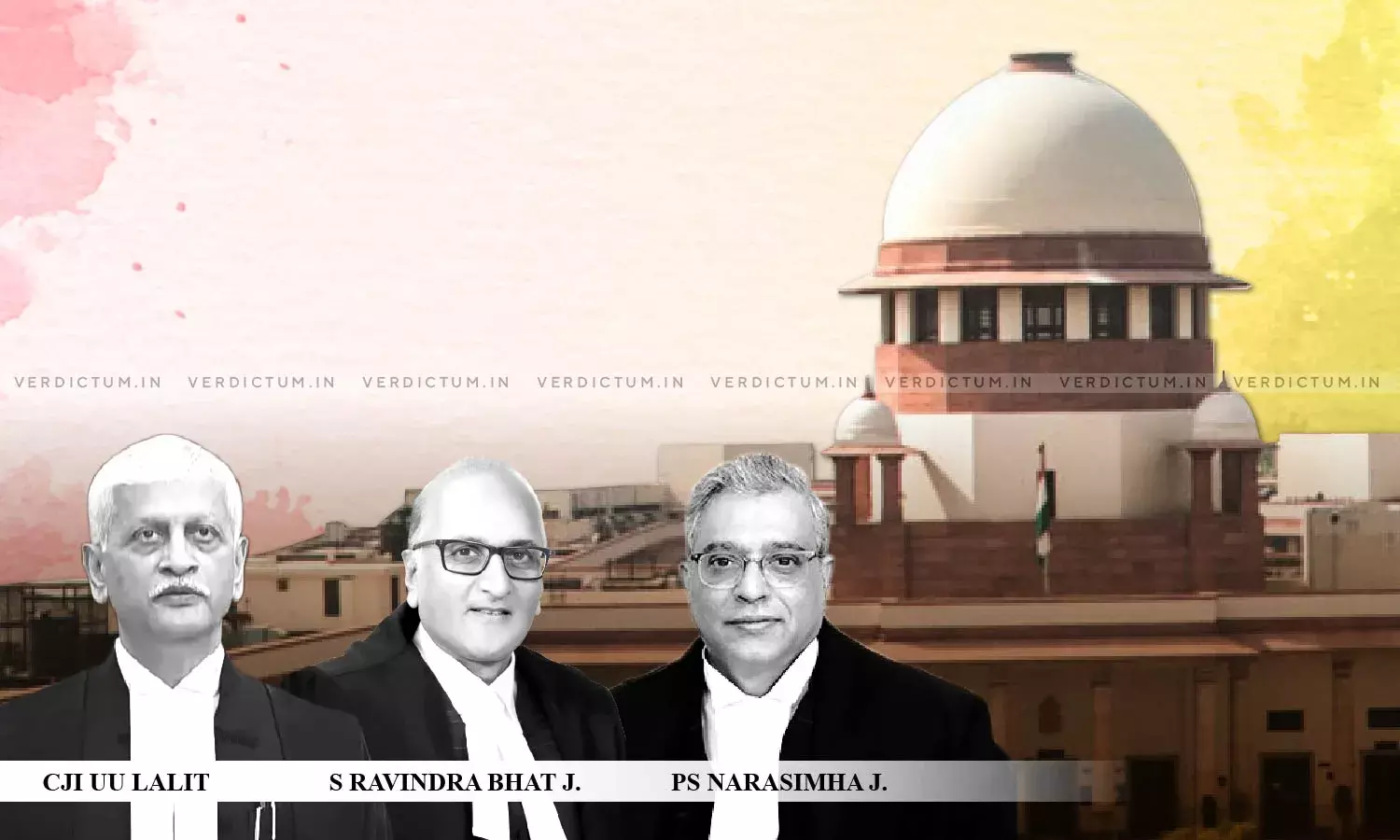Assessee Advancing General Public Utility Cannot Engage In Any Trade, Commerce Or Business To Avail Tax Exemption- SC
The Supreme Court has observed that an assessee advancing general public utility (GPU) cannot engage in any trade, commerce or business in order to avail tax exemptions that are available to organizations carrying on charitable work.
A Bench of CJI UU Lalit, Justice S. Ravindra Bhat, and Justice PS Narasimha observed-
"It is clarified that an assessee advancing general public utility cannot engage itself in any trade, commerce or business, or provide service in relation thereto for any consideration ("cess, or fee, or any other consideration")."
The Bench delivered the 149-page judgment on a batch of appeals that were related to the interpretation of a provision to Section 2(15) of the IT Act.
*Section 2 (15) of the Income Tax Act defines charitable purpose" to include relief of the poor, education, medical relief, preservation of environment and preservation of monuments or places or objects of artistic or historic interest, and the advancement of any other object of general public utility.
The Director General of Income Tax for exemptions had assailed the decisions of various High Courts which had held that carrying on any trade, commerce, or business, is not a per se bar or disqualification for a GPU category charitable trust to claim to be such, precluding its tax-exempt status under the IT Act.
The Income Tax Department had argued before the Court that the law on tax exemption for charitable work was changed to expressly forbid the tax exemption benefit if the entity was involved in carrying on trade or business.
ASG N. Venkataraman appeared for the Revenue, Senior Advocate S.N. Soparkar appeared for assessee-organizations, Senior Advocate Kavin Gulati appeared for NOIDA, Senior Counsel K. K. Chythanya appeared for M/s Karnataka Industrial Areas Development Board before the Court.
The Apex Court noted, "However, in the course of achieving the object of general public utility, the concerned trust, society, or other such organization, can carry on trade, commerce or business or provide services in relation thereto for consideration, provided that (i) the activities of trade, commerce or business are connected ("actual carrying out…" inserted w.e.f. 01.04.2016) to the achievement of its objects of GPU; and (ii) the receipt from such business or commercial activity or service in relation thereto, does not exceed the quantified limit, as amended over the years (Rs. 10 lakhs w.e.f. 01.04.2009; then Rs. 25 lakhs w.e.f. 01.04.2012; and now 20% of total receipts of the previous year, w.e.f. 01.04.2016)."
The Court passed a slew of directions and observed that as far as state cricket associations like Saurashtra, Gujarat, Rajasthan, Baroda, and Rajkot are concerned, their case needed further scrutiny.
"So far as the state cricket associations are concerned (Saurashtra, Gujarat, Rajasthan, Baroda, and Rajkot), this Court is of the opinion that the matter requires further scrutiny," the Court held.
In relation to Private Trusts, the Court held –
"So far as the appeal by assessee-Tribune Trust is concerned, it has been held that despite advancing general public utility, the Trust cannot benefit from exemption offered to entities covered by Section 2(15) as the records reveal that income received from advertisements, constituted business or commercial receipts. Consequently, the limit prescribed in the proviso to Section 2(15) has to be adhered to for the Trust's claim of being as a charity eligible for exemption, to succeed."
The Court while dealing with government authorities and corporations, held –
"The amounts or any money whatsoever charged by a statutory corporation, board or any other body set up by the state government or central governments, for achieving what are essentially 'public functions/services' (such as housing, industrial development, supply of water, sewage management, supply of food grain, development and town planning, etc.) may resemble trade, commercial, or business activities. However, since their objects are essential for advancement of public purposes/functions (and are accordingly restrained by way of statutory provisions), such receipts are prima facie to be excluded from the mischief of business or commercial receipts."
In relation to statutory regulators, the Bench held –
"The income and receipts of statutory regulatory bodies which are for instance, tasked with exclusive duties of prescribing curriculum, disciplining professionals and prescribing standards of professional conduct, are prima facie not business or commercial receipts."
"However, this is subject to the caveat that if the assessing authorities discern that certain kinds of activities carried out by such regulatory body involved charging of fees that are significantly higher than the cost incurred (with a nominal mark-up) or providing other facilities or services such as admission forms, coaching classes, registration processing fees, etc., at markedly higher prices, those would constitute commercial or business receipts. In that event, the overall quantitative limit prescribed in the proviso to Section 2(15) (as amended from time to time) has to be complied with, if the regulatory body is to be considered as one with 'charitable purpose' eligible for exemption under the IT Act."
The Bench further held, "At the cost of repetition, it may be noted that the conclusions arrived at by way of this judgment, neither precludes any of the assessees (whether statutory, or non-statutory) advancing objects of general public utility, from claiming exemption, nor the taxing authorities from denying exemption, in the future, if the receipts of the relevant year exceed the quantitative limit."
The Court held that the assessing authorities must on a yearly basis, scrutinize the record to discern whether the nature of the assessee's activities amount to "trade, commerce or business" based on its receipts and income and further added if it is found that they are in the nature of trade, commerce or business, then it must be examined whether the quantified limit under Section 2(15), has been breached, thus disentitling them to exemption.
Accordingly, the Court disposed of the appeals.
Cause Title – Assistant Commissioner of Income Tax (Exemptions) v. Ahmedabad Urban Development Authority
Click here to read/download the Judgment




